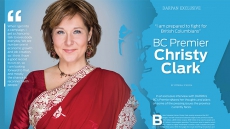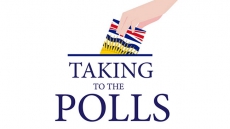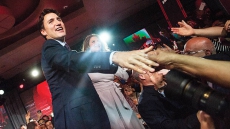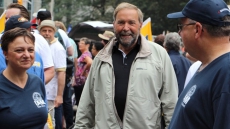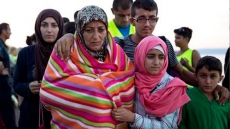Here are highlights of the platforms of the three main parties in the B.C. election:
NDP:
— Families with an annual household income under $125,000 would get a one-time $1,000 COVID-19 recovery benefit, with the benefit going to others on a sliding scale up to a household income of $175,000.
— Individuals with an income of up to $62,000 would receive the $500 recovery benefit, with others getting help up to an income of $87,000.
— A 10-year plan would be launched to improve cancer care, including in rural communities that would also see more money spent on new equipment, screening, diagnosis and treatment services.
— Once it is available and approved, the COVID-19 vaccine would be free to everyone.
— The province would build a new medical school to train more doctors.
— Rents would be frozen until the end of next year, followed by a permanent cap on rent increases set at the rate of inflation.
— The province would spend an additional $3 billion a year for three years to build schools and hospitals, which would create 18,000 new jobs a year.
— New platform spending would cost about $2.2 billion in the 2020-21 fiscal year, excluding the $3-billion annual capital commitment to build new schools and hospitals.
— The platform promises in the following 2021-22 fiscal year would cost $2 billion and 2.7 billion in 2022-23.
— The platform would increase the deficit in 2020-21 from a projected $12.8 billion to $15 billion.
— A previous pledge to bring in $10-a-day child care would be expanded to include free transit for kids up to age 12.
— The NDP would work with the federal government to decriminalize simple possession of small amounts of illicit drugs for personal use because of the opioid crisis.
— ICBC surpluses during the pandemic would be returned to drivers through premium rebates.
— The provincial sales tax would be removed on the purchase of electric bikes.
— The province would begin phasing out single-use plastics.
B.C. Liberal party:
— The seven-per-cent PST would be eliminated for one year, which would cost about $6.9 billion; the tax rate would then be set at three per cent "as the economy grows."
— The Small Business Income Tax would be scrapped, which would save businesses about $217 million a year.
— All provincial taxes would be reviewed by an independent Fair Tax Commission.
— Child care for low-income earners would be set at a rate of $10 a day with additional subsidies provided for middle-class families, while also adding 10,000 new child-care spaces.
— An additional $1 billion would be spent over five years on new long-term care facilities.
— Every senior citizen living in long-term care who wants a private room would be ensured that they have one.
— Legislation to ban early elections during provincial emergencies would be brought in.
— A system of hybrid and online learning would be set up for children during the pandemic.
— Permit processes used for natural resource projects and new housing construction would be streamlined.
— A new tax credit for seniors of up to $7,000 a year would be created to cover home care, costing about $135 million.
— Drivers would be allowed to buy auto insurance more widely and not just from the Crown-owned Insurance Corporation of British Columbia.
— An additional $58 million a year would be spent on police, the Crown prosecution service and to cover the cost of more psychiatric social workers and nurses to improve public safety.
— Spending on infrastructure would be increased by $8 billion over three years, which the party says represents a 35 per cent jump in spending and would bring the total spent on everything from transportation to hospitals to $30.9 billion over three years.
— The Liberals say their platform adds about $2 billion in new operating expenditures for the province, with $1.1 billion of that going to cover the cost of its child-care promises.
Green party:
— Spend $24 million to support student mental health by increasing the number of school counsellors.
— Extend leases for existing housing co-ops that are about to expire while also creating a land bank for new co-ops.
— Create a capital fund to help acquire and maintain rental housing by non-profit organizations.
— Provide a basic income for youth aging out of care.
— Create a rental support program for those paying more than 30 per cent of their income in rent.
— Develop a plan to phase out public funding that goes to for-profit long-term care facilities.
— Provide universal early education for three- and four-year-old children.
— Create a $1 billion innovation fund to shift to a zero-carbon economy as part of a clean recovery plan that includes help for workers.
— Review procedures for wellness checks with a goal of expanding the use of integrated mental health crisis teams.
— In the first year, the platform's promises would cost about $3.8 billion.
— The party says it would spend more than $10 billion over three years to "deliver a green and inclusive recovery from COVID."
— About $1 billion a year would be saved by ending oil and gas subsidies and revenue would rise by increasing the carbon tax.
— The province would recognize the United Nations International Decade for People of African Descent, which says people of African descent represent a distinct group whose human rights must be promoted and protected.
— Introduce equal pay legislation.
— Make prescription contraceptive products free for those under 25 and remove the PST on them.
— Allocate $300 million for a six-month rent subsidy program for small businesses.
— Promote neighbourhood car co-ops with insurance coverage and designated parking areas.
— Make BC Ferries a Crown corporation.
— Commit to make B.C. carbon neutral by 2045, which would match California.

